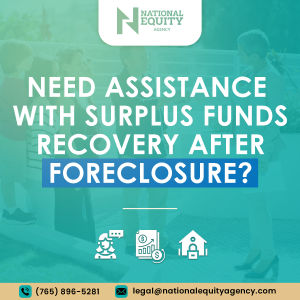
Our professional post-foreclosure recovery service is here to help homeowners retrieve any surplus funds that are rightfully owed to them following a foreclosure sale.

Celebrate Success Stories With Us At National Equity Agency

Empowering Homeowners to Reclaim Surplus Funds After Foreclosure

Surplus Funds Recovery Assistance after Foreclosure

National Equity Agency is a professional surplus recovery company that specializes in helping individuals and organizations recover surplus funds from property sales, particularly after a foreclosure or tax sale.
Surplus funds, often referred to simply as “surplus,” are the remaining funds generated from the sale of a foreclosed property.
BOCA RATON, FL, UNITED STATES, August 1, 2024 /EINPresswire.com/ — What Are Surplus Funds?
Surplus funds, often referred to simply as “surplus,” are the remaining funds generated from the sale of a foreclosed property when the auction price is higher than the total amount owed on the property. This surplus arises after satisfying all outstanding obligations, including the mortgage balance, taxes, liens, and any foreclosure-related expenses mandated by the court’s final judgment. For example, if a property with a foreclosure judgment of $200,000 sells at auction for $225,000, the surplus funds would be $25,000. A budget surplus is when income or revenue exceeds expenditures. Governments and companies with surpluses have additional money that can be reinvested or used to pay off debts. The opposite of a surplus is a deficit, which occurs when spending exceeds revenues.
Surplus funds, often referred to simply as “surplus,” are the remaining funds generated from the sale of a foreclosed property when the auction price is higher than the total amount owed on the property. This surplus arises after satisfying all outstanding obligations, including the mortgage balance, taxes, liens, and any foreclosure-related expenses mandated by the court’s final judgment. For example, if a property with a foreclosure judgment of $200,000 sells at auction for $225,000, the surplus funds would be $25,000. Surplus funds, also known as excess proceeds or “overage,” are the amount of money left over after your foreclosed home has been sold at auction and all the lenders and other lienholders have been paid off. They are essentially the remaining equity that you had in the property.
While foreclosure can feel like an absolute loss, these funds can represent a beacon of potential financial relief – it is money that rightfully belongs to the former homeowner after all debts related to the foreclosure are paid off. Those with surplus money are encouraged to invest with the bank and are paid a certain rate of interest for the same. Surplus funds are also sometimes present when a homeowner has equity in the home at the time of the foreclosure sale. What are surplus funds/proceeds? If a parcel is sold at a foreclosure sale for an amount greater than the minimum bid.
When a lender forecloses on a property, it’s typically sold at a public auction. In California, a lender can foreclose either by going to trial or without going to trial, according to the Judicial Branch of California. Surplus liquidity refers to the excess funds or cash available in the banking system beyond the immediate requirements of banks and the economy. If your property is sold in a tax deed sale and the sale proceeds exceed the amount of taxes, interest, penalties, and costs owed, you are entitled to the surplus funds. These surplus funds are typically paid to the former property owner after all the debts and costs associated with the sale have been covered.
Either way, the goal of foreclosure is to recover the amount owed by the homeowner. However, it’s not uncommon for these properties to fetch a higher price than the debt amount due to market conditions or property desirability. Surplus funds refer to the residual money left over after a property has been sold through foreclosure auction.
The surplus is calculated by subtracting the outstanding mortgage debt, accrued interest, fees, and any other associated foreclosure costs from the final sale price. The amount of money remaining after the subtraction constitutes what is called “surplus funds.” In another example, let’s assume the price per barrel of oil drops, causing gas prices to dip below the price a driver is accustomed to shelling out at the pump. Funds are amounts of money that are available to be spent, especially money that is given to an organization or person for a particular purpose. Surplus Funds can be claimed by the foreclosed homeowner when excess funds/proceeds are left over after the sale of the property
What Are Surplus Funds?
Q: What exactly are surplus funds?
A: Surplus funds are the leftover proceeds from the sale of a foreclosed property when the sale price exceeds the total amount owed, including the mortgage balance, taxes, liens, and foreclosure-related expenses. These funds are typically available to the former homeowner.
Q: How do surplus funds come about in a foreclosure?
A: Surplus funds arise when a foreclosed property is sold at auction for more than the total amount needed to satisfy all debts and expenses. The difference between the sale price and the total debt becomes surplus funds.
Q: Can surplus funds be claimed by anyone other than the homeowner?
A: No, surplus funds should be claimed by the former homeowner or the person who had ownership rights before the foreclosure. These funds are not meant to be claimed by anyone else after the sale. Surplus funds are the remaining proceeds from a foreclosure sale after all debts secured by the property, such as the mortgage and liens, have been satisfied. When a property is sold in a foreclosure auction, it often sells for more than the amount owed on the mortgage. The excess amount, after all secured debts are paid, constitutes the surplus funds.
The process involves several steps:
Initial Consultation: We assess your eligibility and explain your options.
Research and Documentation: Our team conducts thorough research to identify any surplus funds owed to you.
Filing the Claim: We handle all the legal paperwork and filings.
Follow-Up and Advocacy: We maintain communication with the courts and advocate on your behalf.
Receiving Your Funds: Once the claim is approved, you receive the funds minus our agreed-upon fee.
Who Can Claim Surplus Funds?
Q: Who is entitled to claim surplus funds after a foreclosure?
A: Typically, the former homeowner or the party with ownership rights before the foreclosure is entitled to claim surplus funds. In some cases, if there are outstanding second mortgages or liens, those parties might have claims on the funds first.
Q: What if I didn’t receive a notification about surplus funds?
A: If you didn’t receive notification about surplus funds, you may still be entitled to them. It is crucial to follow up with the trustee or foreclosure court to verify if surplus funds are available and to file a claim.
How Do I Know If Surplus Funds Are Available?
Q: How can I find out if surplus funds are available after my foreclosure?
A: You should receive a notification letter from the trustee or court if surplus funds are available. If you did not receive this notification, you can contact the trustee or review the foreclosure records to check for any surplus funds.
Q: Where can I find the information about surplus funds?
A: Information about surplus funds is usually detailed in the certificate of disbursements or a notification letter from the trustee. You can also review the public records related to your foreclosure case. Claiming Surplus Funds After Foreclosure
Homeowners are entitled to claim surplus funds after a foreclosure auction. These funds belong to the former property owner once all debts related to the property have been paid off. NEA is committed to guiding homeowners through this process, providing crucial support and expertise every step of the way.
Steps to Take If There Are Surplus Funds From Your Foreclosure Sale
If surplus funds are believed to be available from a foreclosure sale, it is essential to contact the
How to Claim Surplus Funds
Q: What steps do I need to take to claim surplus funds?
A: To claim surplus funds, you generally need to:
1. Provide proof of ownership (such as a copy of the title).
2. Verify the amount of surplus funds by reviewing foreclosure records.
3. Contact the trustee or lienholder to inform them of your claim.
4. Submit a formal claim to the trustee and court.
5. Attend any required hearings or court proceedings.
Q: What documentation is required to claim surplus funds?
A: You typically need to provide proof of ownership, such as the property title, and any documentation related to the foreclosure, including the certificate of disbursements and the Deposit of Surplus Funds letter.
Q: How long does it take to receive surplus funds once a claim is filed?
A: The timeframe can vary. After filing a claim, it may take several weeks to a few months to process and disburse the funds, depending on the court’s schedule and the completeness of your claim.
Potential Issues and Considerations
Q: What if there are disputes about who should receive the surplus funds?
A: Disputes can arise if multiple parties claim a right to the funds, such as second mortgage holders. In such cases, the court may need to adjudicate who is entitled to the surplus funds based on priority and legal claims. Foreclosure surplus funds: Also known as excess funds or overage, these are the funds left over after a foreclosed home is sold at auction and all liens and lenders have been paid off. They are essentially the remaining equity in the property and can be a source of financial relief for the former homeowner.
Q: Can surplus funds be used to settle outstanding debts?
A: Yes, surplus funds can be used to settle any outstanding debts or obligations, such as second mortgages or liens. However, any remaining funds after these debts are settled should be given to the homeowner. Surplus funds are the excess funds that are left over after a home has been sold via foreclosure.
Q: What if I miss the deadline to claim surplus funds?
A: If you miss the deadline, the funds may be turned over to the court or another party. It’s essential to act promptly and file your claim as soon as you are aware of the surplus funds to avoid losing them. The foreclosure surplus funds calculation is based on the difference between the sale price and the amount owed to the lender, when a foreclosure sale results in surplus funds (money over and above what’s needed to pay off all the liens on the property) In Florida, the owner of record on the date a lis pendens is filed is generally entitled to surplus funds after subordinate lienholders have filed claims. However, junior lienholders may lose their rights if they don’t respond to foreclosure proceedings or follow the correct procedures. To claim surplus funds, the claimant must submit a claim to the court and trustee, who will then determine if the claimant is owed funds. This process may involve hearings and motions, and the claimant may need to reach out to multiple lenders if there are second or third mortgages on the property. If the claimant doesn’t claim the funds within two to three months, the court will keep them.
Q: Are there any fees associated with claiming surplus funds?
A: There may be fees associated with legal assistance or filing your claim, but the process itself should not require a fee beyond administrative costs. Be sure to inquire about any potential costs with the trustee or your attorney.
Q: How can National Equity Agency help with claiming surplus funds?
A: National Equity Agency specializes in recovering surplus funds from foreclosures. They can assist you by navigating the complex process, ensuring all necessary documentation is provided, and helping you file a claim to secure the funds you are owed.
Additional Information
Q: Are surplus funds taxable?
A: Surplus funds are generally considered taxable income. It’s advisable to consult with a tax professional to understand any tax implications associated with receiving surplus funds.
Q: Can I claim surplus funds if I lost my home to a foreclosure several years ago?
A: Yes, surplus funds can potentially be claimed even if the foreclosure happened several years ago, as long as the funds are still available. It’s important to check the current status of any surplus funds from your past foreclosure. Surplus funds are monies due to you following completion of your remortgage. This will occur when you are borrowing more money from your new lender than you need to pay off your existing lender. Your law firm will arrange with you to send these directly to you on the day of completion.
Q: How can I prevent losing surplus funds in future foreclosures?
A: To avoid losing surplus funds, ensure that you stay informed throughout the foreclosure process, keep accurate records, and follow up on any notifications about surplus funds. Engaging with a professional experienced in surplus recovery can also help.
What Are Surplus Funds?
Surplus funds, also referred to as excess proceeds, are the remaining money from a foreclosure or tax sale after all debts and obligations related to the property have been satisfied. When a property is sold at auction due to foreclosure or tax delinquency, the sale proceeds are meant to cover outstanding debts like the mortgage balance, property taxes, liens, and foreclosure costs. If the final sale price exceeds these debts, the surplus funds are generated. Surplus Funds is a term used in the Final Accounting process and refers to an amount of loan or grant proceeds in excess of expenditures for the asset purchased (or constructed) with applicable proceeds. The Source of Funds (amount of loan or grant) less the Use of Funds (allowable expenditures) is the amount, if any, of Surplus Funds. A Sources and Uses Form is used to document and report Surplus Funds as part of the Final Accounting process.
Surplus Funds is a term used in the Final Accounting process and refers to an amount of loan or grant proceeds in excess of expenditures for the asset purchased (or constructed) with applicable proceeds
For instance, if a property has a mortgage debt of $150,000 and sells at auction for $200,000, the surplus funds would amount to $50,000.
How Do Surplus Funds Arise?
Surplus funds arise when the sale price of a foreclosed or tax-delinquent property exceeds the total amount owed to creditors and other lienholders. This can occur due to various factors, including increased property values, competitive bidding at auctions, and the accumulation of penalties and interest on overdue taxes. Surplus funds are the extra money gained from a foreclosure sale. Sometimes properties will sell at auction for more than what is owed
Typically, the former homeowner of record at the time of foreclosure and any subordinate lienholders, such as second mortgage holders or judgment creditors, are eligible to claim surplus funds. “Owner of record” means the person or persons who appear to be owners of the property that is the subject of the foreclosure proceeding on the date of the filing of the lis pendens. In determining an owner of record, a person need not perform a title search and examination but may rely on the plaintiff’s allegation of ownership in the complaint when determining the owner of record. “Surplus funds” or “surplus” means the funds remaining after payment of all disbursements required by the final judgment of foreclosure and shown on the certificate of disbursements. Surplus funds are extra monies above the foreclosure judgment amount held by the Clerk of Court following a sale in a foreclosure case.
Eric Malone
National Equity Agency
+1 812-413-5465
email us here
Visit us on social media:
Facebook
LinkedIn
Instagram
Other
![]()
